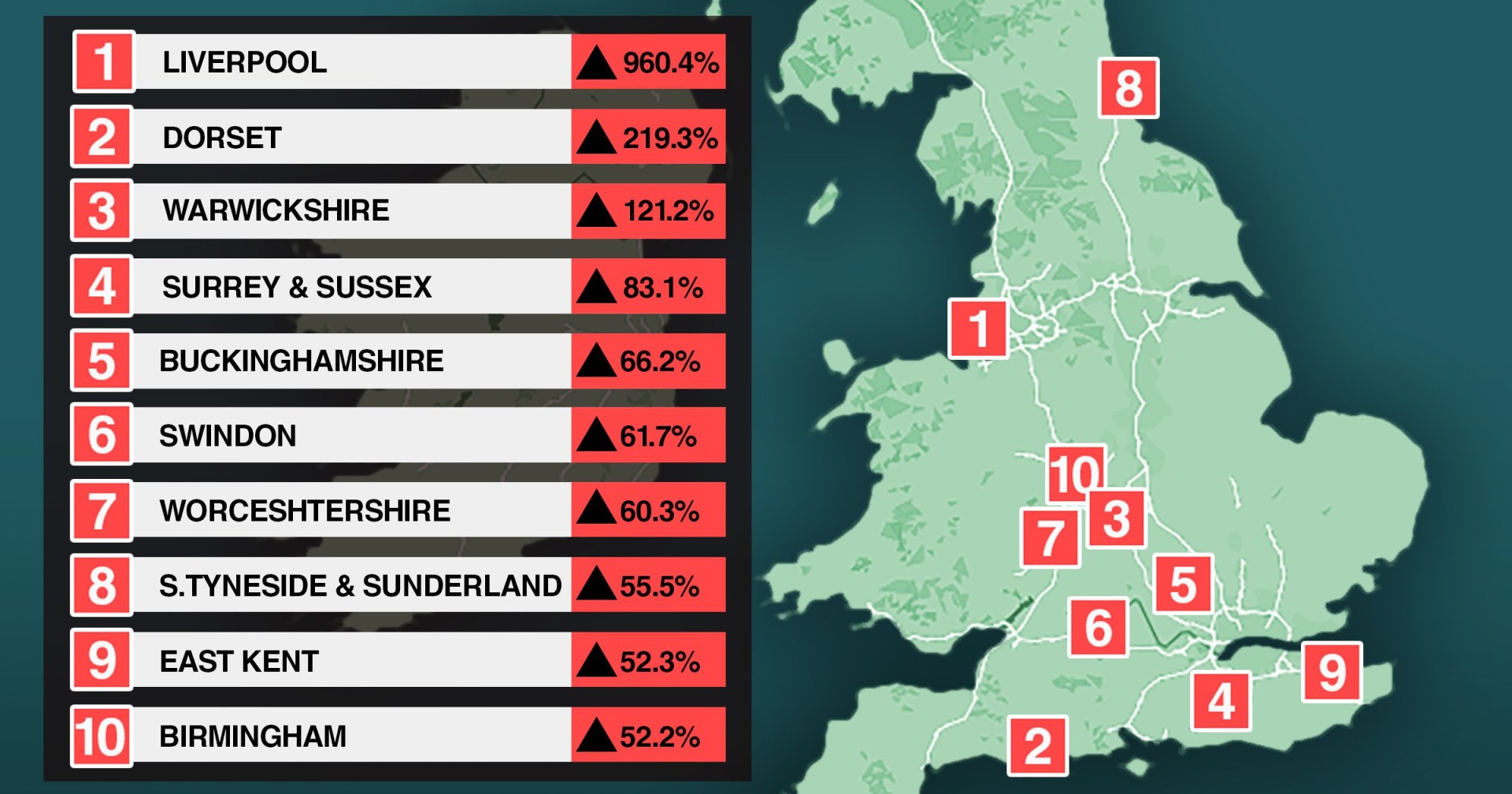
MAP SHOWS WHERE VICTORIAN ILLNESS IS MAKING A COMEBACK
A Victorian illness is making a major comeback as figures show cases rose by 960% in one area of England.
Gout, a painful type of arthritis, was known as ‘the disease of kings’ historically as it was believed to be triggered by overindulging on rich food and alcohol.
But in recent years the illness has become much more widespread as it becomes easier to find foods high in fat, sugar and salt.
Figures from NHS trusts across England, obtained through Freedom of Information requests, found gout cases have increased massively between 2019 and 2023, the most recent data available.
The area worst affected by gout was Liverpool where 5,864 cases were recorded in 2023 – a 960% increase on 2019.
Dorset was another area of major gout growth with a rise of 219% in cases over the period, followed by South Warwickshire, which saw a 121% rise in cases.
Navin Khosla a pharmacist at NowPatient, the online pharmacy who carried out the investigation, said the impact of gout on patients should not be underestimated.
He said: ‘The main symptoms of gout are sudden and severe bouts of pain, which will usually start in the big toe but it can also present itself in the feet, wrists, ankles and other joints of the body.
‘Another indication of gout is when the skin over the area of pain turns swollen or red, so if you do experience any of these symptoms, you can take ibuprofen to help ease the pain.’
Gout isn’t the only Victorian-era illness seeing a surge in Liverpool, as malnutrition cases have shot up by 447% in the last five years.
Malnutrition refers to people not getting the right amount of nutrients, meaning it isn’t the same as starvation – and while gout is linked to obesity, it is possible to be both overweight and malnourished, leading to a trend experts call the ‘hunger-obesity paradox’.
What is gout?
Gout is a type of arthritis that causes sudden, severe joint pain.
It’s caused by an excess of uric acid in the blood, which can form crystals around the joints which causes the pain.
Gout is more common in men and sometimes runs in families.
You may have a higher chance of getting gout if you’re overweight, drink alcohol, have been through menopause, have had surgery or an injury, or take certain medicines or suffer from certain health problems, like high blood pressure.
The main symptoms of gout are:
- sudden severe pain in a joint – usually your big toe, but it can be in other joints in your feet, ankles, hands, wrists, elbows or knees
- hot, swollen, red skin over the affected joint – redness may be harder to see on black or brown skin
An attack of gout usually lasts one to two weeks if left untreated. If you do not get treatment, future attacks may last even longer. Leaving gout untreated may cause lasting damage to joints.
The rise in Victorian-era diseases has in part been linked to the cost of living crisis, which has caused some lower-income families to cut fresh foods like fruit and vegetables from their diets.
Rob Hotson, a registered nutritionist and adviser for Healthspan, said poor diets are of particular concern for people mainly eating ultra processed foods (UPF).
He explained: ‘Malnutrition could mean vitamin and mineral deficiencies which is perfectly plausible even if you are obese and the quality of your diet is poor.
‘UPFs are low in fibre, vitamins and minerals but every energy dense and easy to over consume, causing weight gain.
‘Low-income individuals and families often have limited financial resources, leading them to purchase inexpensive, calorie-dense, nutrient-poor foods.
‘These foods, such as fast food, processed snacks, and sugary beverages, are high in calories but low in essential nutrients.
‘This represents how people in places like the UK and US can eat enough to be obese but can suffer health problems from their diet being so nutritionally poor.’
Get in touch with our news team by emailing us at [email protected].
For more stories like this, check our news page.
Get your need-to-know latest news, feel-good stories, analysis and more by signing up to Metro's News Updates newsletter
2024-06-12T09:03:11Z dg43tfdfdgfd